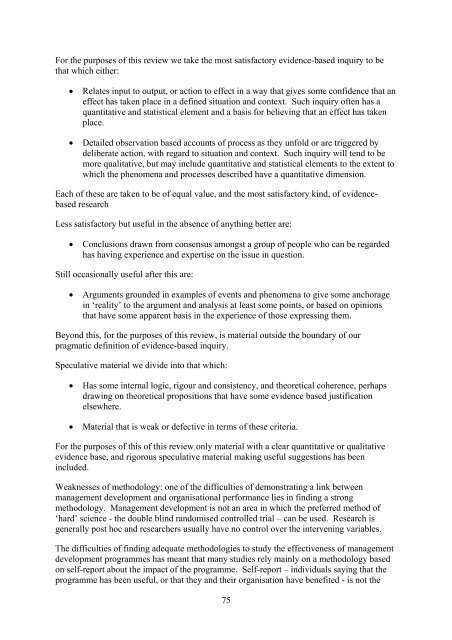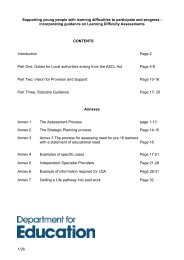The Development of Management and Leadership Capability and its ...
The Development of Management and Leadership Capability and its ...
The Development of Management and Leadership Capability and its ...
Create successful ePaper yourself
Turn your PDF publications into a flip-book with our unique Google optimized e-Paper software.
For the purposes <strong>of</strong> this review we take the most satisfactory evidence-based inquiry to be<br />
that which either:<br />
• Relates input to output, or action to effect in a way that gives some confidence that an<br />
effect has taken place in a defined situation <strong>and</strong> context. Such inquiry <strong>of</strong>ten has a<br />
quantitative <strong>and</strong> statistical element <strong>and</strong> a basis for believing that an effect has taken<br />
place.<br />
• Detailed observation based accounts <strong>of</strong> process as they unfold or are triggered by<br />
deliberate action, with regard to situation <strong>and</strong> context. Such inquiry will tend to be<br />
more qualitative, but may include quantitative <strong>and</strong> statistical elements to the extent to<br />
which the phenomena <strong>and</strong> processes described have a quantitative dimension.<br />
Each <strong>of</strong> these are taken to be <strong>of</strong> equal value, <strong>and</strong> the most satisfactory kind, <strong>of</strong> evidencebased<br />
research<br />
Less satisfactory but useful in the absence <strong>of</strong> anything better are:<br />
• Conclusions drawn from consensus amongst a group <strong>of</strong> people who can be regarded<br />
has having experience <strong>and</strong> expertise on the issue in question.<br />
Still occasionally useful after this are:<br />
• Arguments grounded in examples <strong>of</strong> events <strong>and</strong> phenomena to give some anchorage<br />
in ‘reality’ to the argument <strong>and</strong> analysis at least some points, or based on opinions<br />
that have some apparent basis in the experience <strong>of</strong> those expressing them.<br />
Beyond this, for the purposes <strong>of</strong> this review, is material outside the boundary <strong>of</strong> our<br />
pragmatic definition <strong>of</strong> evidence-based inquiry.<br />
Speculative material we divide into that which:<br />
• Has some internal logic, rigour <strong>and</strong> consistency, <strong>and</strong> theoretical coherence, perhaps<br />
drawing on theoretical propositions that have some evidence based justification<br />
elsewhere.<br />
• Material that is weak or defective in terms <strong>of</strong> these criteria.<br />
For the purposes <strong>of</strong> this <strong>of</strong> this review only material with a clear quantitative or qualitative<br />
evidence base, <strong>and</strong> rigorous speculative material making useful suggestions has been<br />
included.<br />
Weaknesses <strong>of</strong> methodology: one <strong>of</strong> the difficulties <strong>of</strong> demonstrating a link between<br />
management development <strong>and</strong> organisational performance lies in finding a strong<br />
methodology. <strong>Management</strong> development is not an area in which the preferred method <strong>of</strong><br />
‘hard’ science - the double blind r<strong>and</strong>omised controlled trial – can be used. Research is<br />
generally post hoc <strong>and</strong> researchers usually have no control over the intervening variables.<br />
<strong>The</strong> difficulties <strong>of</strong> finding adequate methodologies to study the effectiveness <strong>of</strong> management<br />
development programmes has meant that many studies rely mainly on a methodology based<br />
on self-report about the impact <strong>of</strong> the programme. Self-report – individuals saying that the<br />
programme has been useful, or that they <strong>and</strong> their organisation have benefited - is not the<br />
75
















